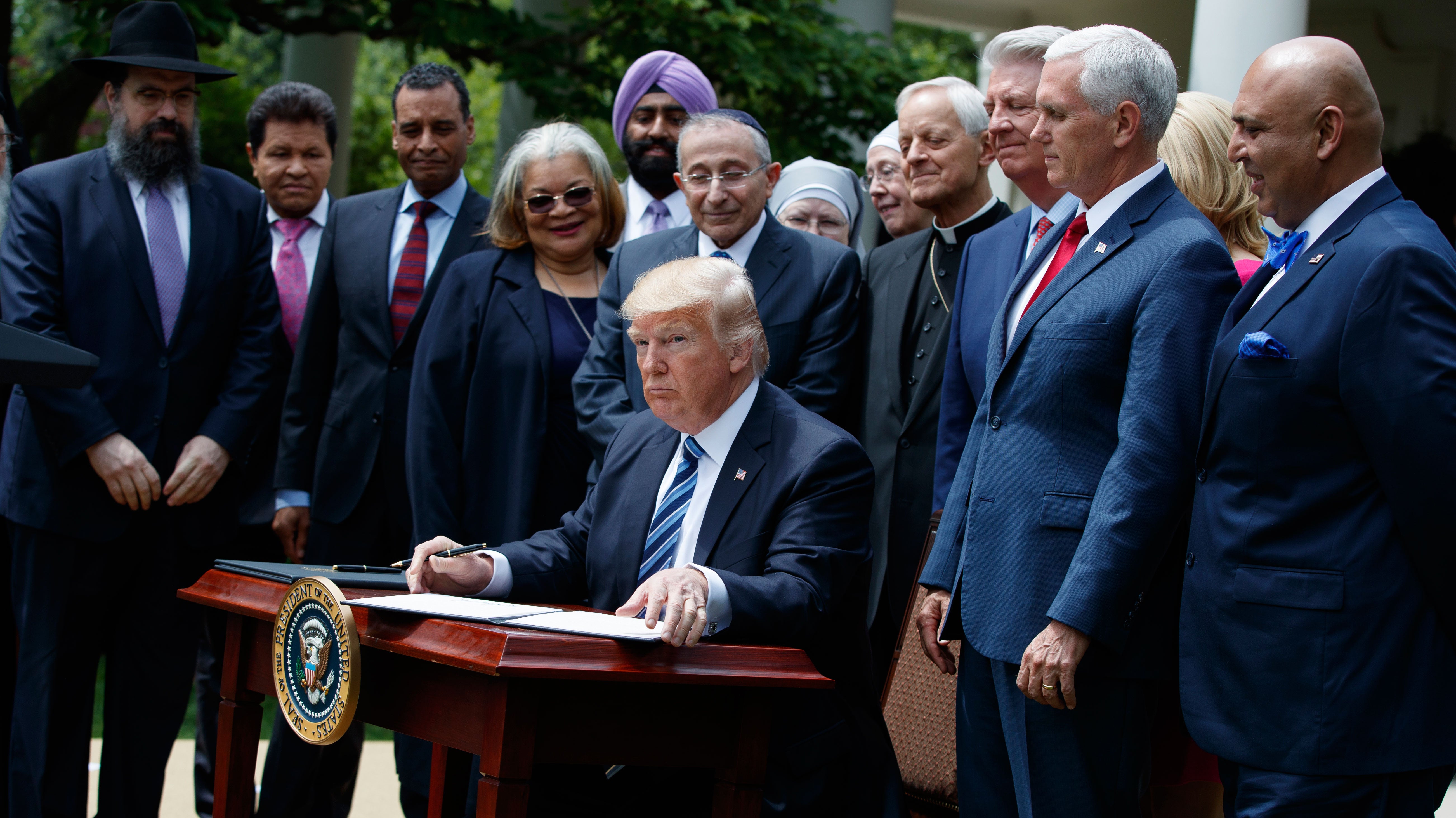Religious leaders react as Trump relaxes rule on mixing politics and pulpit
Listen
President Donald Trump signs an executive order aimed at easing an IRS rule limiting political activity for churches, Thursday, May 4, 2017, in the Rose Garden of the White House in Washington. (Evan Vucci/AP Photo)
Last summer, Pennsylvania pastor Gary Dull was one of the hundreds of evangelical Christians who filled a ballroom in New York City to hear from candidate Donald Trump.
“He said, ‘You know, I don’t understand why some of you pastors don’t preach everything you’d like to preach,'” Dull recalled.
Then, he said, Trump made a promise: to scrap a 63-year-old part of the federal tax code known as the Johnson Amendment that bars churches and similar nonprofits from endorsing or opposing political candidates. If they do, the IRS can take away their tax-exempt status.
Thursday, President Trump gathered supporters in the White House Rose Garden to watch him sign an executive order loosening those restrictions.
“We are giving our churches their voices back,” the president said. “We are giving them back in the highest form.”
Dull sees the move as a promise kept — and an opportunity.
“My senator in the Pennsylvania state Senate is John Eichelberger, and I have gone out in the past as a citizen, and I have endorsed John Eichelberger. I’ve never done that from my pulpit,” he said. “But now, I would have the freedom as the pastor of the Faith Baptist Church of Altoona to do that from my pulpit without the fear of any kind of governmental oppression.”
And that’s exactly what Dull said he plans to do.
Only Congress has the authority to repeal the Johnson Amendment, but Trump has asked the IRS to use its discretion and to avoid cracking down on religious organizations and charities.
The last time the IRS enforced this law was in the mid-’90s, but the Pennsylvania Pastors Network, of which Dull is president, and other organizations have pushed to end it for the sake of preserving religious freedom.
But others say the system is already working just fine.
“I’ve always had freedom in the black pulpit to preach a Gospel message and a message that lifts up social justice,” said J. Louis Felton, pastor of Mount Airy Church of God in Christ in the West Oak Lane section of Philadelphia.
The church hosted presidential candidate Hillary Clinton the Sunday before November’s election, and Felton endorsed Clinton as a member of the Black Clergy of Philadelphia and Vicinity. The group is not a 501(c)3, Felton said, but even with the protections Trump is offering, he would never make endorsements from the pulpit.
“We preach Christ,” he said. “I’m never going to get up and preach a judge. I’m not going to preach a president. I’m not going to preach a senator, but I will take a stand on issues — and if that individual who is a candidate can stand with me on those issues, then I think we can work out a partnership.”
Philadelphia pastor Alison Cornish said she believes attaching faith matters to a candidate or elected official under any circumstances can work against an organization’s mission.
Cornish heads Pennsylvania Interfaith Power and Light, a coalition of about 50 congregations from several religions that advocates action on climate change. She was with group members in Washington, D.C., last week, talking to U.S. Senate staffers about the need to keep nonprofits nonpartisan.
“We really believe that a moral voice, a faith voice on the issue of sustainability, including our planet, but for all people, are nonpartisan issues,” she said.
Otherwise, Cornish said, the divides among Americans could deepen — not heal, which is why she said the coalition is careful to refer to elected offices, not individual politicians by name.
Cornish said it’s not a matter of avoiding trouble with the IRS either. She has previously served as a Unitarian Universalist minister to congregations in New York and New England, and Cornish made a policy of keeping her voting preferences to herself.
“To me, as soon as I’m identified with a political party, there are certain judgments and assumptions made about many aspects of my personhood,” she said. “And I don’t feel like I can effectively minister to all people who cross that threshold if I’m painted too broadly with a particular political brush.
“It’s hard enough to keep congregations together when you’re not naming an individual.”
WHYY is your source for fact-based, in-depth journalism and information. As a nonprofit organization, we rely on financial support from readers like you. Please give today.

